You can achieve radiantly hydrated skin by incorporating a few simple habits into your daily routine. These practices not only enhance your skin’s moisture but also improve its overall health and appearance. From adjusting your hydration levels to choosing the right skincare products, you’ll discover effective ways to nurture your skin from within. Embracing these changes can lead to a noticeable transformation, leaving your complexion looking fresh and revitalized. Dive into this guide to find out how you can maintain that desirable glow effortlessly.
Table of Contents
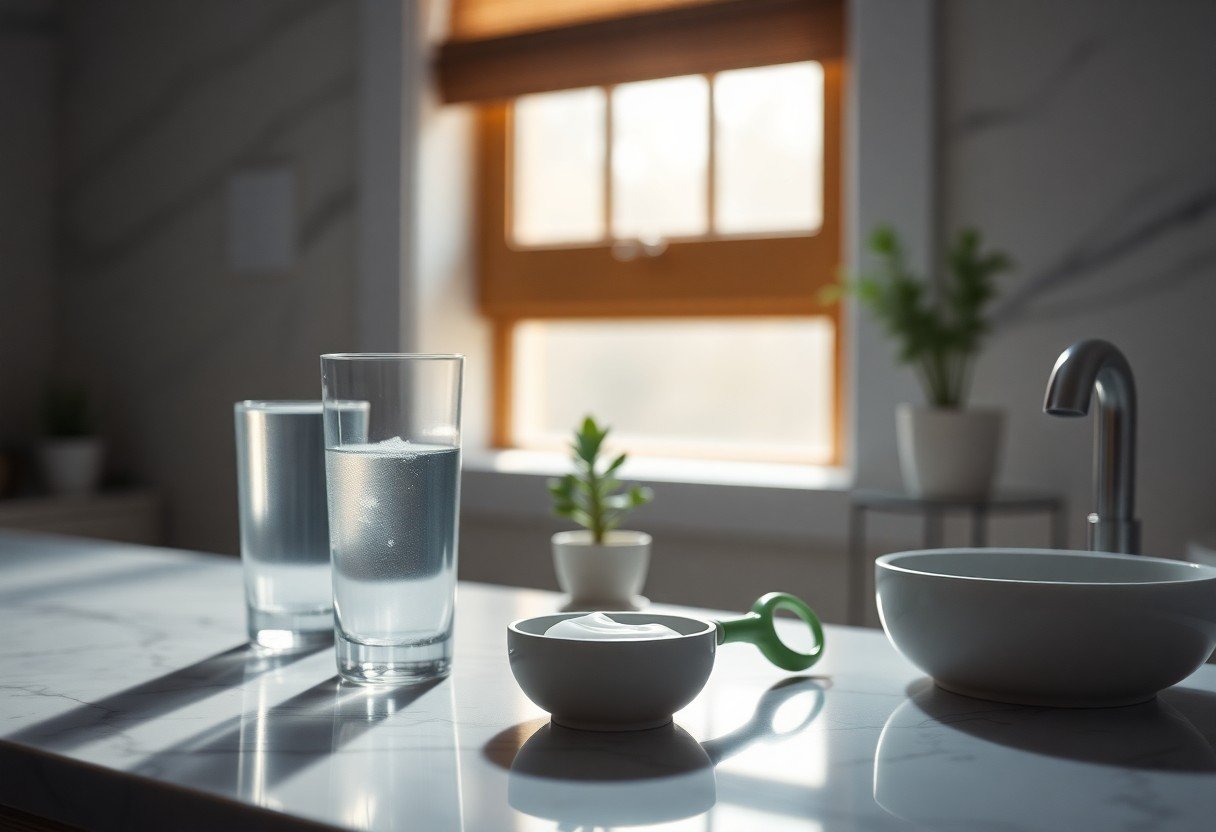
Key Takeaways:
- Stay Hydrated: Consuming adequate water daily is vital for maintaining skin moisture levels.
- Moisturize Effectively: Using a good quality moisturizer helps lock in moisture and prevents dryness.
- Limit Hot Showers: Hot water can strip the skin of its natural oils; opt for lukewarm water instead.
- Choose the Right Products: Look for skincare products containing ingredients like hyaluronic acid and glycerin that attract moisture.
- Incorporate Humidifiers: Using a humidifier, especially in dry environments, can help keep the skin from drying out.
Understanding Skin Hydration
To fully appreciate how to maintain naturally hydrated skin, it is necessary to understand the unique needs of your skin. Hydration is not merely the application of water or moisturizers; it involves recognizing the specific characteristics of your skin type and how these influence its hydration levels (5 Hydration Myths That Harm Your Skin). Moisture retention is vital to keeping your skin healthy and resilient against environmental stressors. When you understand the factors at play, you can adopt practices that cater specifically to your skin’s hydration needs.
Types of Skin and Their Hydration Needs
Needs differ significantly depending on your skin type. Here is a breakdown of common skin types and their respective hydration needs (5 Skincare Tips for Different Skin Types):
| Skin Type | Hydration Needs |
|---|---|
| Oily | Lightweight moisturizers that won’t clog pores |
| Dry | Heavy creams to lock in moisture |
| Combination | Dual-action products suitable for both oily and dry areas |
| Sensitive | Fragrance-free and gentle formulations |
| Normal | Balanced moisturizers for maintenance |
After learning about these distinctions, you’ll find it easier to choose the right products and develop an effective skincare routine that nurtures your unique hydration requirements.
Factors Affecting Skin Hydration
Factors such as weather, age, diet, and personal habits all play significant roles in maintaining your skin’s hydration levels (5 Factors That Deplete Your Skin’s Hydration). For instance, exposure to harsh climatic conditions, such as cold winds or humidity, can elevate your skin’s thirst for moisture. Additionally, as you age, your skin’s natural ability to retain moisture diminishes, requiring a shift in how you care for it. To achieve optimal hydration, it’s necessary to be aware of these factors and adjust your regimen accordingly.
- Environmental factors: Humidity levels can impact hydration.
- Diet: Influences your skin’s internal hydration from the inside out.
- Age: Affects your skin’s moisture-retaining abilities.
- Skincare products: Play a significant role in skin hydration.
- Daily habits: Impact hydration levels through lifestyle choices.
This understanding empowers you to make informed choices that enhance your skin’s moisture levels and overall health.
Enhancing Skin Hydration Through Lifestyle
Certain elements like smoking, alcohol consumption, and excessive sun exposure can negatively impact your skin’s hydration (5 Lifestyle Changes for Healthier Skin Hydration). On the other hand, maintaining a balanced diet rich in vitamins and antioxidants, along with consistent hydration through water intake, can promote better skin health. Additionally, using appropriate skincare products tailored to your skin type will provide significant advantages.
- Hydration: Necessary for skin elasticity and radiance.
- Smoking: Reduces blood flow and dehydrates the skin.
- Alcohol: Contributes to dehydration and breaks down collagen.
- Sunscreen: Shields your skin from UV damage and helps maintain moisture.
- Exfoliation: Regular exfoliation allows for better absorption of moisturizers.
This comprehensive approach to your skin’s hydration needs will yield visible and lasting improvements.
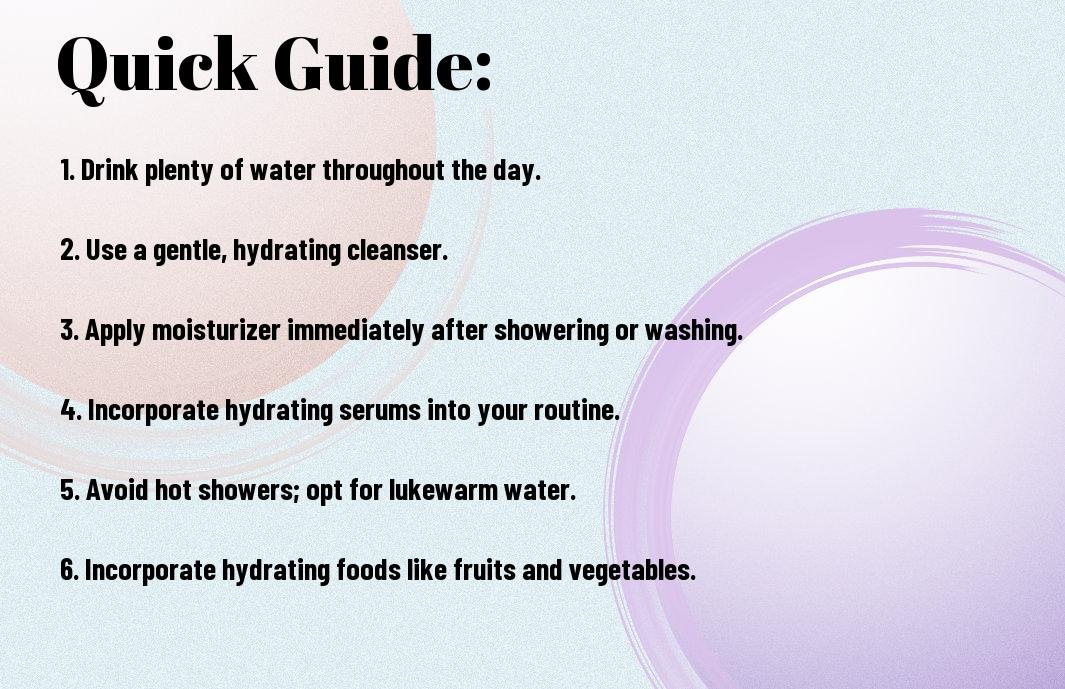
Essential Tips for Hydrated Skin
Some effective methods for achieving and maintaining hydrated skin are simple yet impactful (5 Best Tips for Naturally Glowing Skin). To ensure your skin remains supple and radiant, consider the following necessary tips:
- Drink plenty of water throughout the day.
- Use a daily moisturizer suitable for your skin type.
- Incorporate hydrating serums with hyaluronic acid.
- Avoid excessive exposure to hot water, which can dry out your skin.
- Use a humidifier to add moisture to your environment, especially in dry climates.
Integrating these habits into your routine will promote better moisture retention in your skin. Perceiving these changes over time will lead to visibly healthier and more vibrant skin.
Daily Skincare Routine
The foundation of healthy, hydrated skin lies in a consistent skincare routine (5 Steps for a Flawless Skincare Routine). Start your day by cleansing your skin with a gentle cleanser to remove impurities without stripping away natural oils. Follow this by applying a hydrating toner, which helps to balance your skin’s pH levels and prepares it for better absorption of subsequent products. Daily application of a moisturizer tailored to your skin type not only keeps your skin hydrated but also creates a protective barrier against environmental factors.
Evening routines are equally important. Make it a habit to cleanse your face again to eliminate makeup and pollutants. After cleansing, apply a rich night cream or oil to allow your skin to absorb all the nourishing ingredients as you sleep. Don’t overlook the importance of a weekly exfoliation to eliminate dead skin cells and allow your moisturizer to penetrate more deeply, enhancing your skin’s overall hydration.
Dietary Habits for Moisture
Now, focusing on your diet is necessary for achieving moisturized skin from the inside out (5 Foods That Hydrate Your Skin Naturally). Including a variety of fruits and vegetables in your meals can significantly boost your skin’s hydration levels. Foods high in water content, like cucumbers, watermelon, and oranges, help to keep your body and skin hydrated. Additionally, healthy fats, such as those found in avocados, nuts, and olive oil, can contribute to skin elasticity and a natural glow.
Hydrated skin is not just about topical products; it’s about creating a holistic approach that encompasses your food choices. A diet rich in omega-3 fatty acids, antioxidants, and vitamins will enable your skin to retain moisture more effectively. It’s also important to limit your intake of sugary and processed foods, which can lead to inflammation and dry skin conditions. Prioritize consuming whole foods that nourish your body and maintain your skin’s hydration levels effectively.
Step-by-Step Hydration Techniques
Not everyone is aware of the simple yet effective methods to keep their skin hydrated. By adopting these step-by-step hydration techniques, you can enhance your skin’s moisture retention and overall appearance. The process involves tailored approaches using a range of products and natural remedies that cater to your skin type and needs. Here’s a concise breakdown to guide you.
Hydration Techniques Overview
| 1. Start with Cleansing | Begin with a gentle cleanser to remove impurities without stripping natural oils. |
| 2. Exfoliate Regularly | Use exfoliants to eliminate dead skin cells, allowing better absorption of hydrating products. |
| 3. Apply Toner | Use a hydrating toner to balance skin pH and prep for other products. |
| 4. Layer Your Moisturizers | Utilize lightweight serums followed by heavier creams for deeper hydration. |
| 5. Finish with SPF | Protect your skin from UV damage, which can lead to moisture loss. |
Layering Products for Optimal Effect
Layering your skincare products can be highly beneficial for maintaining hydration levels and ensuring your skin receives the nutrients it requires (5 Best Ways to Layer Skincare for Maximum Hydration). Start with the lightest products, such as serums and essences, and gradually build to heavier ones, like creams and oils. This method allows your skin to absorb lighter formulations effectively while sealing in moisture with thicker products.
As you layer, consider using a hyaluronic acid serum first since it attracts moisture to your skin, followed by a rich moisturizer that locks in hydration. Don’t forget to give each product a moment to absorb before applying the next layer to avoid overwhelming your skin.
Natural Remedies for Hydration
Techniques using natural ingredients can also greatly enhance your skin’s hydration levels (5 Natural Ingredients for Hydrated Skin). Incorporating products like aloe vera, honey, and coconut oil into your routine can provide additional moisture without the harsh chemicals often found in commercial skincare. These ingredients have soothing and nourishing properties that work to restore your skin’s barrier function.
Another option is to use a homemade hydrating mask. Combining avocado, honey, and olive oil creates a rich blend full of vitamins and fatty acids that effectively hydrate and rejuvenate your skin. Regularly integrating these natural remedies can lead to soft, supple skin that feels revitalized and healthy, all while minimizing exposure to potentially harmful additives.

The Pros and Cons of Different Hydration Methods
All hydration methods have their own set of advantages and disadvantages when it comes to maintaining moisture in your skin. Understanding these pros and cons can help you make informed choices about which methods align best with your skincare needs and lifestyle. Here’s a breakdown of several popular hydration techniques:
Hydration Method Pros and Cons
| Method | Pros and Cons |
|---|---|
| Humidifiers | Pros: Improves indoor air moisture, alleviates dry skin; Cons: Requires regular cleaning, can promote mold if overused. |
| Natural Moisture | Pros: Involves no chemicals, promotes skin’s natural processes; Cons: May be less effective in dry climates. |
| Creams and Lotions | Pros: Immediate hydration, often contains beneficial ingredients; Cons: Some may cause irritation or allergies. |
| Face Mists | Pros: Refreshing, easy to use on the go; Cons: Effects may be short-lived. |
| Over-the-Counter Products | Pros: Wide variety available, often targeted for specific skin types; Cons: Some contain harsh chemicals. |
| Effective Diet | Pros: Enhances skin health from within, promotes overall wellness; Cons: Takes time to see visible results. |
| Water Intake | Pros: Fundamental for hydration, easy to increase; Cons: Needs consistency for long-term benefits. |
| Sunscreen Moisturizers | Pros: Multi-functional, protection from UV rays; Cons: May feel heavy on the skin. |
| Essential Oils | Pros: Natural aroma, calming effects; Cons: May cause allergic reactions in some. |
| Varied Routine | Pros: Keeps skin fresh and adaptable; Cons: Can be overwhelming to maintain. |
Using Humidifiers vs. Natural Moisture
To address skin hydration, using a humidifier versus relying on natural moisture sources both offer unique advantages (5 Benefits of Humidifiers for Skin). A properly maintained humidifier significantly enhances indoor humidity levels, combating the drying effects of heating systems, especially in colder months. This method helps your skin feel more refreshed and supple. Alternatively, natural moisture techniques, such as placing bowls of water around your home or taking cooler, shorter showers, offer a chemical-free approach to retaining skin hydration. However, natural methods may lack effectiveness in extremely arid climates.
Both approaches have their merits, but if you reside in a particularly dry area, a humidifier can provide consistent moisture that natural methods may struggle to achieve. Balancing these options ensures you choose the most effective method for your specific needs and environment.
Over-the-Counter Products: Benefits and Drawbacks
Over-the-counter hydration products are convenient and offer immediate solutions for dry skin (5 Must-Have OTC Products for Hydration). These products often include beneficial ingredients like hyaluronic acid or glycerin, which enhance moisture retention. However, some formulations may contain harsh chemicals or allergens that can irritate sensitive skin, making it crucial to select products wisely.
While such products can provide quick relief, it’s essential to read ingredient lists carefully to avoid irritating agents that may compromise your skin barrier in the long term. Consider dermatologically tested, gentle options tailored to your skin type to minimize risks and maximize benefits. For those with sensitive skin, patch testing new products is a vital step to ensure compatibility before full use. This cautious approach empowers you to navigate the abundance of hydration solutions confidently.
Lifestyle Changes for Better Hydration
Keep in mind that making simple lifestyle changes can significantly improve your skin’s hydration levels. You can start by integrating healthy habits into your daily routine. Focus on maintaining a well-balanced diet rich in omega-3 fatty acids, antioxidants, and vitamins. These nutrients not only provide necessary hydration but also support your skin’s barrier function, keeping it supple and radiant. Additionally, consistently drinking enough water throughout the day is vital; aim for at least eight 8-ounce glasses to ensure your body remains hydrated.
Exercise and Its Impact on Skin
Engaging in regular physical activity benefits not only your overall health but also your skin’s appearance (5 Ways Exercise Boosts Skin Health). Exercise improves blood circulation, delivering essential nutrients and oxygen to your skin cells more efficiently. This process promotes a natural glow and supports skin repair and rejuvenation. Additionally, sweating during workouts helps to flush out toxins, reducing the likelihood of clogged pores and breakouts. Regular movement acts as a catalyst for clearer, healthier skin while enhancing your body’s natural detoxification processes.
Stress Management Techniques
Effectively managing stress can play a crucial role in maintaining hydrated and balanced skin (5 Stress-Relief Techniques for Glowing Skin). Stress triggers the release of cortisol, which can disrupt your skin’s moisture balance by increasing oil production and dehydration. To counteract these effects, incorporate stress-reducing practices such as mindfulness meditation, deep breathing exercises, or yoga. These methods help regulate cortisol levels, allowing your skin to stay healthier and more hydrated.
Making lifestyle adjustments like dedicating time for relaxation and pursuing hobbies you love can significantly improve your overall well-being. These changes not only contribute to emotional balance but also positively impact your skin’s hydration and appearance. By adopting stress management techniques, you create a harmonious environment for your body and skin, paving the way for a radiant and hydrated complexion.
Hydration Myths and Facts
Despite the widespread belief that drinking large quantities of water alone can deliver all the hydration your skin needs, the truth is more nuanced. While staying adequately hydrated is imperative, your skin’s hydration is influenced by various factors, including environmental conditions, skin type, and the products you use. To learn more about effective hydration techniques, check out this article on How to Hydrate Skin Like a Pro, According to Dermatologists. Understanding these variables will help you develop a skin-care routine that supports your unique needs.
Common Misconceptions About Hydration
A prevalent myth is that oily skin does not require hydration; however, even oily skin can suffer from dehydration (5 Myths About Oily Skin and Hydration). Dehydrated skin may trigger the skin to overproduce oil, leading to a cycle of breakouts and imbalanced skin. Similarly, relying solely on topical products for hydration is another misconception. While creams and serums play a vital role, achieving optimal hydration requires a combination of consistent internal hydration and external care.
Understanding these misconceptions allows you to make informed decisions about your skincare routine. Remember, hydration is universal across all skin types and extends beyond the surface level, emphasizing the importance of a holistic approach.
Evidence-Based Solutions
Hydration isn’t just about drinking water; it’s about selecting effective products that target your skin’s unique needs (5 Best Ingredients for Maximum Hydration). Ingredients like hyaluronic acid act as humectants, drawing moisture into the skin, while glycerin helps seal in hydration for long-lasting effects. Moisturizers enriched with ceramides are particularly effective at strengthening the skin barrier, preventing moisture loss even in harsh environments.
For maximum results, integrate a gentle cleanser into your routine, followed by a hydrating serum and moisturizer. Applying moisturizer to damp skin helps lock in hydration more effectively. Consistency in combining internal hydration with the right external products will not only quench your skin but also enhance its overall health and glow.
Conclusion
Ultimately, achieving naturally hydrated skin doesn’t demand an overwhelming or complex skincare regimen. Instead, focus on implementing simple, sustainable habits that align with your lifestyle (5 Easy Habits for Hydrated Skin). Prioritize hydration by drinking enough water, incorporating hydrating foods like cucumbers and watermelon into your diet, and committing to a basic skincare routine that emphasizes gentle cleansing and effective moisturizing. Adjustments to your environment, such as using a humidifier in drier climates, can also play a crucial role in maintaining optimal hydration.
Additionally, never underestimate the influence of holistic wellness on your skin. Getting adequate sleep, managing stress effectively, and engaging in regular physical activity can significantly boost your overall well-being and skin health (5 Ways Wellness Boosts Skin Hydration). By embracing these straightforward yet impactful habits, you can build a solid foundation for healthy, hydrated skin that glows naturally. Your dedication to these practices ensures that your skin remains soft, supple, and vibrant for years to come, giving you the confidence to let your inner beauty shine.
FAQ:
Q: What are some quick habits to keep my skin hydrated throughout the day?
A: To maintain hydration, consider adopting a few easy habits. Drink water consistently throughout the day (5 Ways Hydration Boosts Your Skin), carry a hydrating facial mist to refresh your skin when it feels dry, and use a humidifier at home during dry seasons to replenish moisture in the air. Lastly, incorporate a lightweight moisturizer in your daily routine to lock in hydration and protect your skin barrier.
Q: How important is diet in maintaining hydrated skin?
A: Diet plays a critical role in skin hydration. Consuming foods rich in water content, such as cucumbers and watermelon, and incorporating healthy fats from avocados and nuts can boost your skin’s moisture levels (Top 5 Hydrating Foods for Radiant Skin). A balanced diet with fruits, vegetables, and whole grains ensures hydration and supports skin health from within.
Q: Can I hydrate my skin from the outside? What products should I use?
A: Absolutely! Moisturizing externally is essential for keeping skin hydrated. Use products with hydrating ingredients like hyaluronic acid, glycerin, and ceramides to lock in moisture (5 Best Hydrating Ingredients for Skin). Start with a hydrating serum, then layer on a quality moisturizer to create a barrier against moisture loss. This simple step helps keep your skin smooth and supple throughout the day.
Q: How does my skincare routine impact skin hydration?
A: Your skincare routine significantly affects hydration levels. Avoid harsh cleansers that strip natural oils and opt for hydrating cleansers to maintain your skin barrier (Top 5 Cleansers for Hydrated Skin). Proper exfoliation improves absorption of hydrating products, but over-exfoliating can cause dryness. A routine that prioritizes hydration and nourishment can make all the difference.
Q: Are there specific environmental factors that affect skin hydration?
A: Yes, environmental factors like dry weather, air conditioning, and heating systems can sap moisture from your skin. Combat these with a humidifier to maintain air moisture indoors (5 Ways to Protect Your Skin in Dry Weather). Additionally, prolonged sun exposure can dehydrate your skin, so sunscreen is essential for hydration and protection against damage.




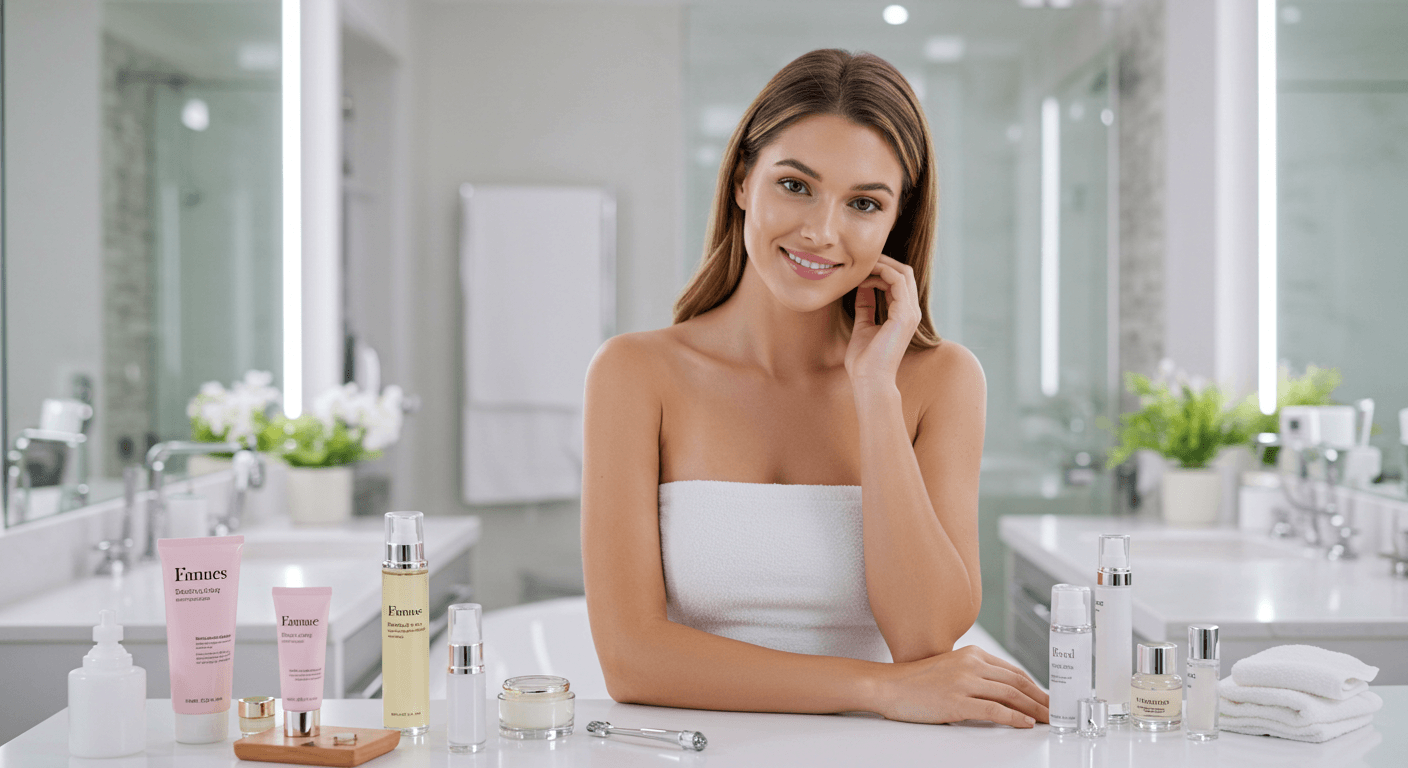
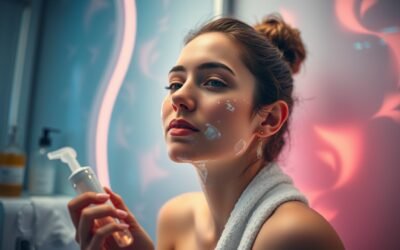
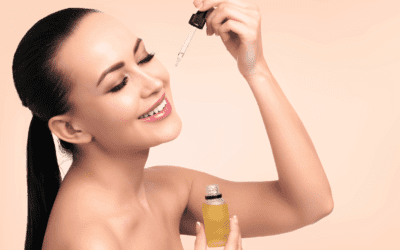

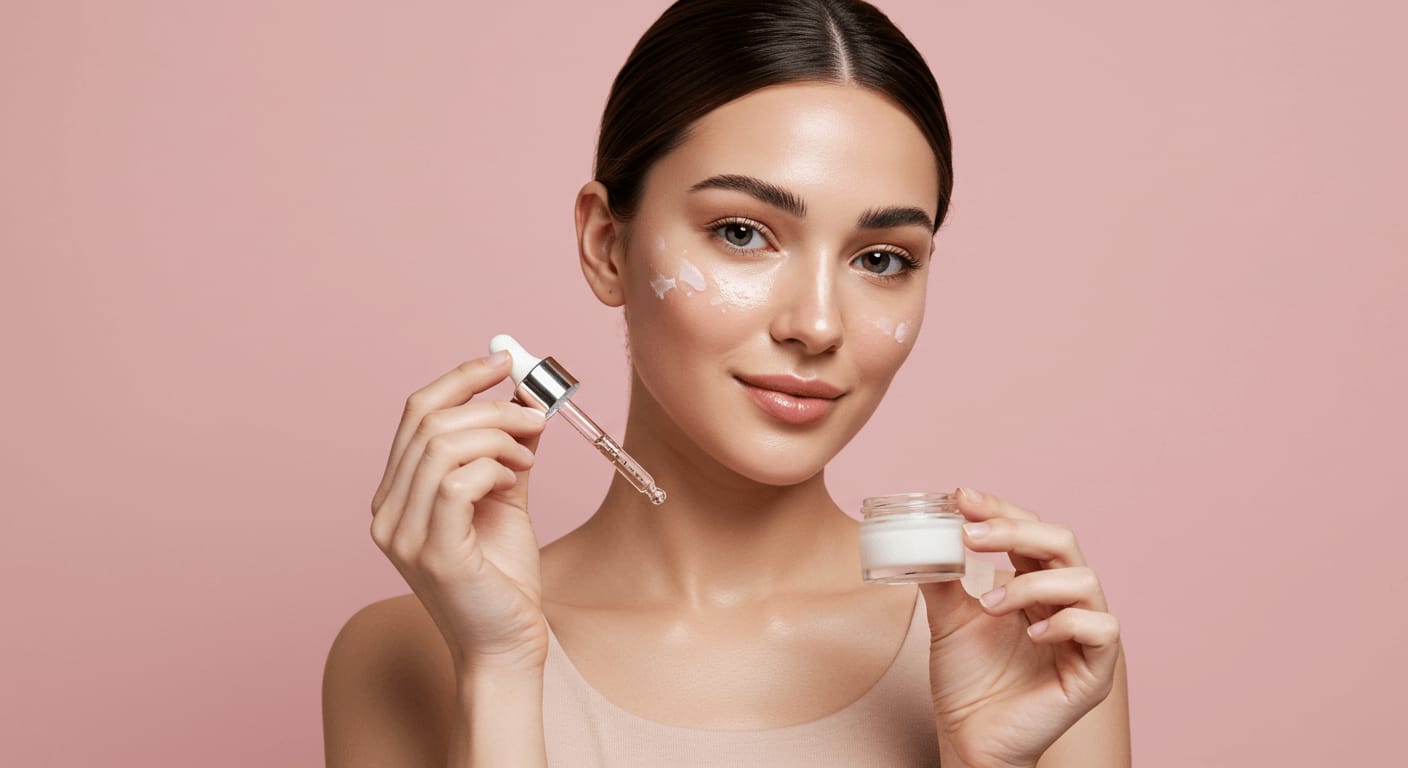



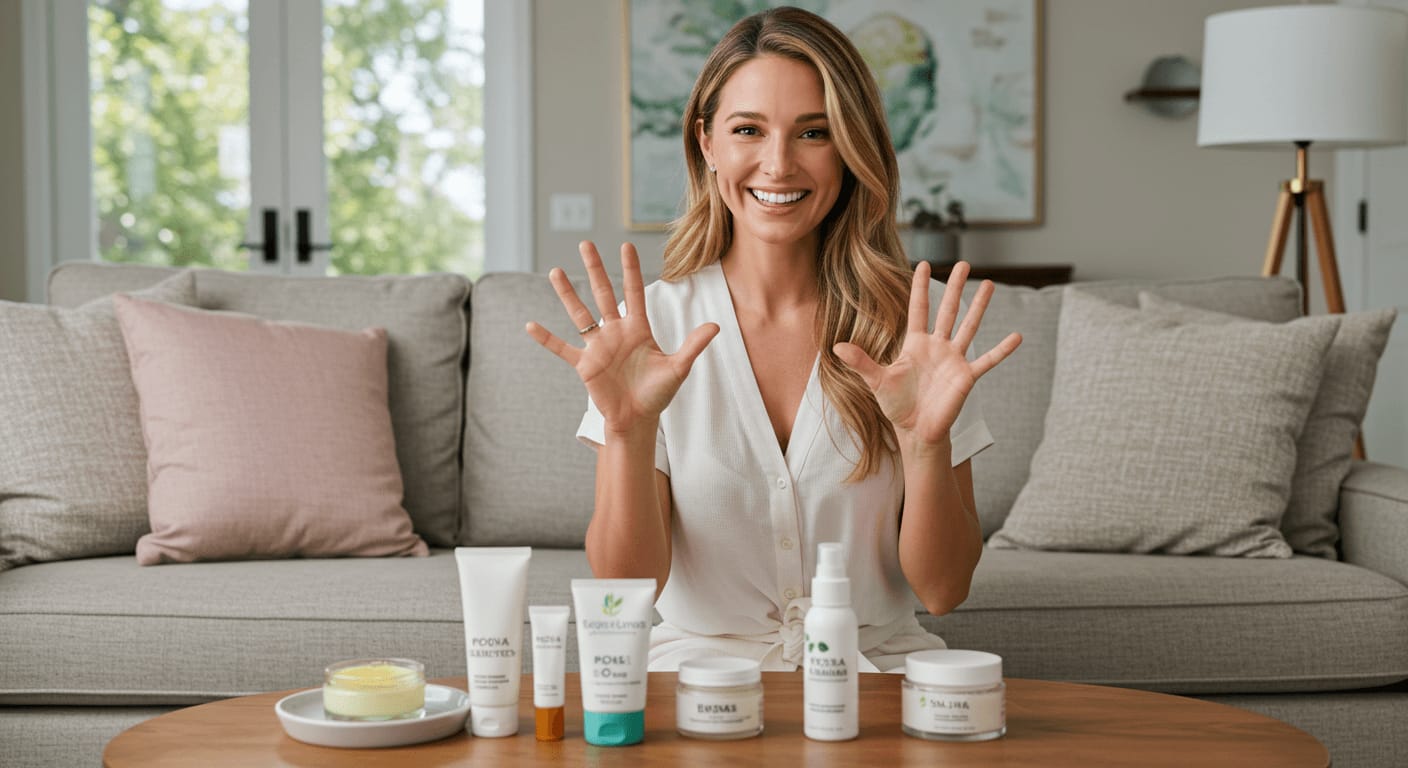



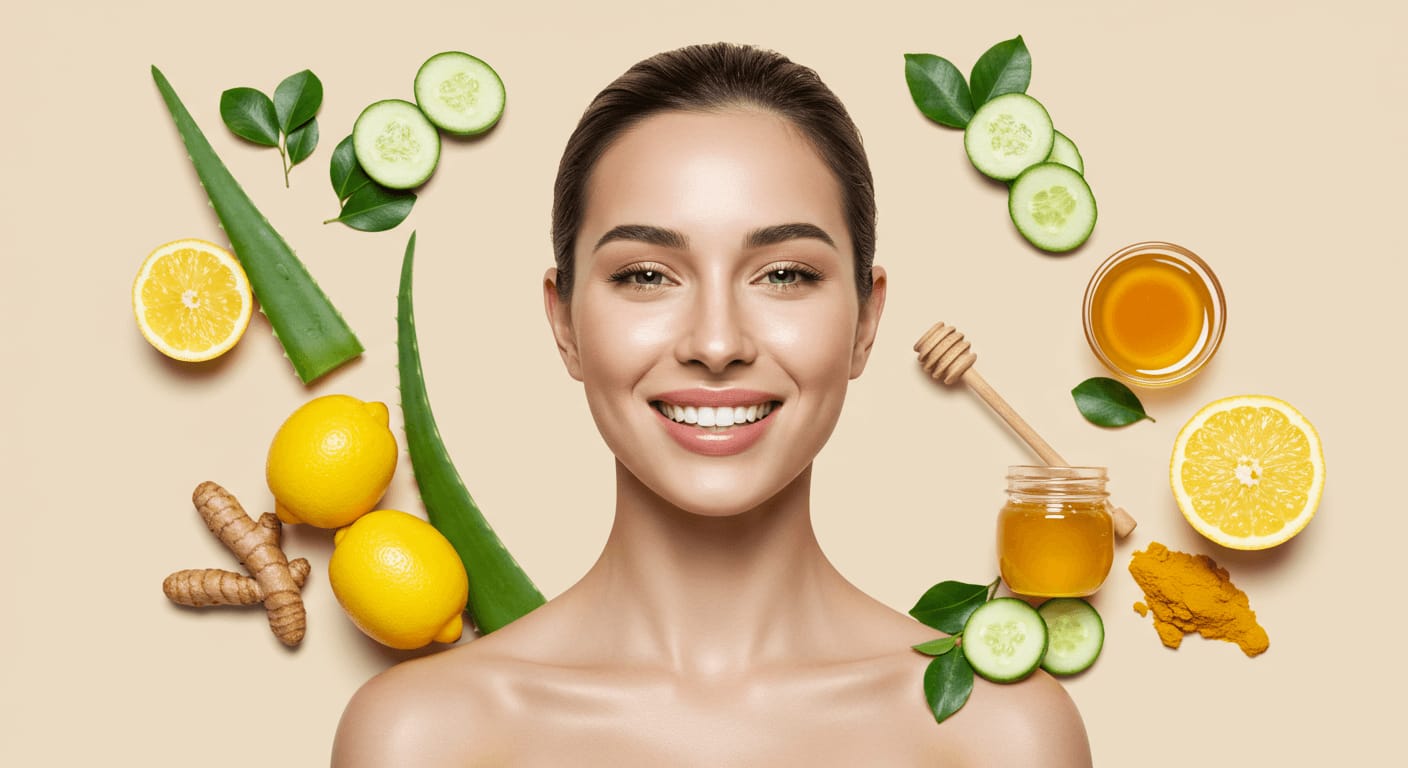

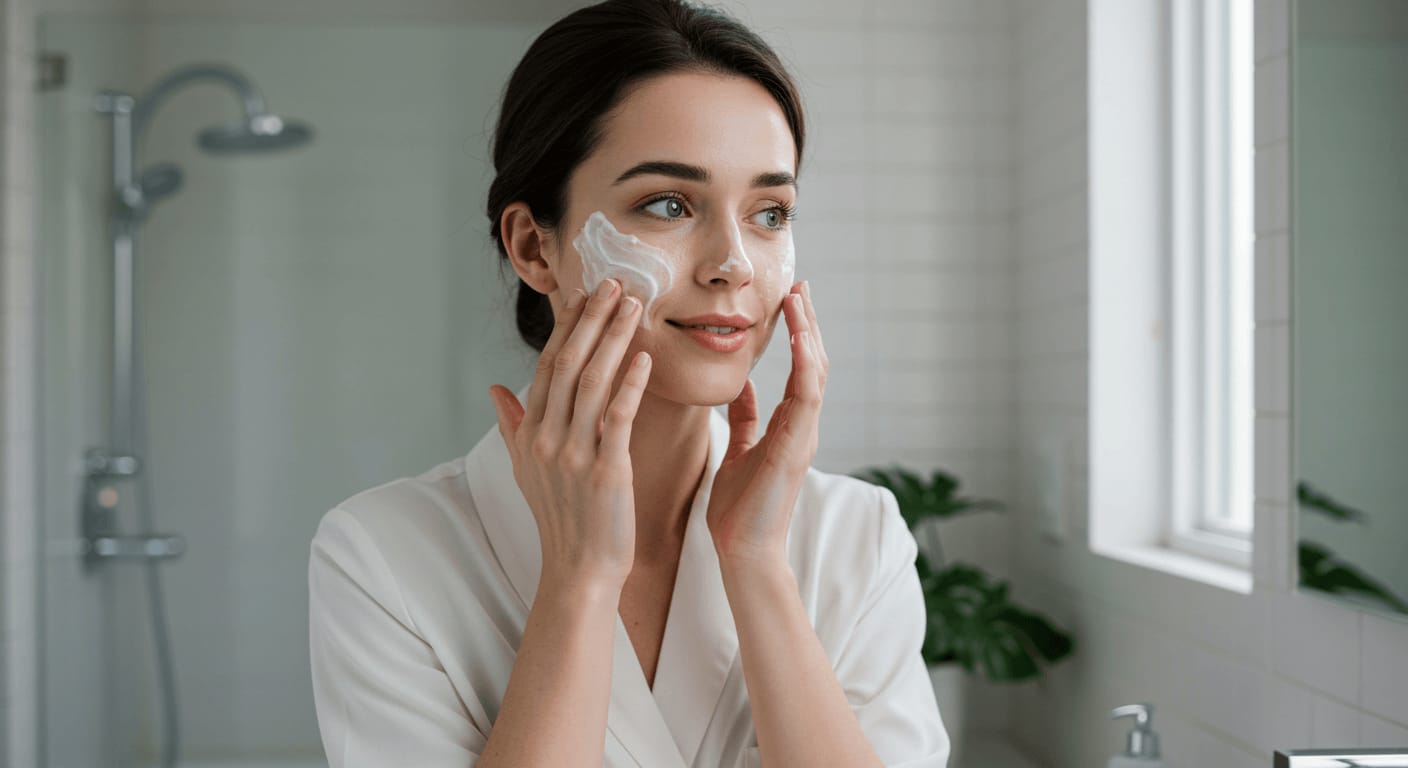








0 Comments